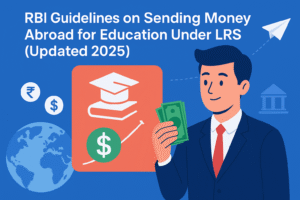Konkona Biswas
08/23/2025
INTRODUCTION
Studying abroad is a big deal, but paying back an education loan can be challenging, especially if you have to wait for a job or if unforeseen bills come up. A lot of kids and their families are worried about what would happen if they miss a payment. This blog talks about what happens when you don’t pay back a loan and gives you useful tips on how to stay financially safe, such as how using dependable solutions like IBRLIVE may help you save money.
What Will Happen If You Don’t Pay Back Your Education Loan?
- Your credit score goes down.
Your CIBIL score goes down when you miss EMIs. If you have a low credit score, it may be harder for you to borrow money in the future, get credit cards, or even get employment or visas that require a financial background check. - The loan turns into a non-performing asset (NPA).
Your loan is categorized as a Non-Performing Asset (NPA) if you don’t make any payments for more than 90 days. Under the SARFAESI Act, banks can send recovery notices, hire collection agencies, or start legal action for secured loans. - Co-Borrowers Are Responsible
A parent or guardian is usually a co-applicant for most student loans. If they don’t pay, the bank can go after them for recovery, which could hurt their credit history or financial situation. - The interest keeps going up.
Interest keeps adding up even during the moratorium period, which is usually 6 to 12 months after the end of the course. If you don’t plan your repayments ahead of time, the total amount of the loan goes up a lot before the EMIs even start.
Why Students Have Trouble Paying Back?
- They can’t get a job or a work visa right away.
- Living costs are high in other countries.
- When sending money, you lose money on currency exchange.
- Not knowing what the moratorium terms are
- Sending money in ways that cost a lot and eat up savings
- In some cases, students opt for student educational loans with no cosigner and no credit, which often come with higher interest rates or tougher repayment terms if not handled properly.
Partial Foreclosure: A Good Choice
If you can’t pay back the whole loan but have some money saved up, partial foreclosure is a good choice. It lets you pay off part of your loan before the conclusion of the term. This decreases the principal balance, lowers future interest, and makes EMIs easier to handle. Most banks do not charge fees for paying off education loans without collateral early.
Rohit’s Smarter Way to Pay Back: A Case Study
Rohit, a student in Canada, was about to finish his term, but he still hadn’t had a job offer. His family had to help him out for a few more months. They started utilizing IBRLIVE to send money at better exchange rates and with no hidden costs.
They saved more than ₹1.2 lakh in remittance fees and rate differences over the course of a year. With this increased money, Rohit was able to partially pay off his debt and lower his EMI by about 18%. He kept making his payments on time and didn’t default.
Things You Can Do to Avoid Defaulting on a Loan
Plan Ahead While You’re Taking Your Course
Get ready for EMIs during the moratorium. If you can, save or make money by working part-time.
Make Some Prepayments
Even tiny one-time payments lower the amount of interest you have to pay over time.
Use Better Ways to Send Money
Banks that are not online charge more in fees and interest. Under the RBI’s Liberalised Remittance Scheme (LRS), platforms like IBRLIVE offer live foreign rates, no hidden fees, and quick processing.
Speak with your bank
If it seems hard to pay back your debt, ask for a restructure. Depending on your situation, banks may give EMI breaks, longer loan terms, or lower interest rates. You can also explore options like no-credit-check student loans from private student loan servicers, though these should be chosen carefully and transparently.
Questions that are asked a lot
Will I go to jail if I don’t pay back my education loan?
No. Not paying back a loan is a civil matter, not a criminal one. But you could lose your credit and have to go to court.
Can not paying back a loan hurt my future abroad?
Yes. Having a bad credit history could make it harder to get a job, renew a visa, or get more student loans.
Can I change the terms of my student loan or refinance it?
Yes. Most banks let you change the terms of your loan. You could also look into refinancing at a cheaper interest rate.
What effect does foreign exchange have on my loan?
Changes in currency values and excessive transfer fees might make the actual cost of paying back a loan higher. Using services that the RBI has approved, like IBRLIVE, can assist ease this strain.
In conclusion, don’t worry; we’re here to help.
Paying back a student debt doesn’t have to be hard. You can remain on top of your responsibilities and keep your financial future safe if you have the correct plan and help.
We know how hard it is for students and families to send money abroad at IBRLIVE. That’s why we provide RBI’s LRS, which is a safe and cheap way to send money that saves you money on every transaction.
So don’t worry about paying it back; just take a breath. You don’t have to do things the hard way, and you’re not alone. We’ll help you manage better, one payment at a time, with smarter tools and the proper counsel.


